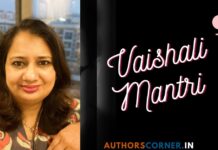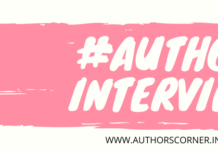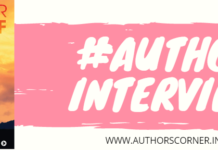1. At what age did you start writing?
I had a pathetic vocabulary (in both Hindi and English) back in my Junior School; yet, I was an utterly garrulous being, always on a lookout for a good conversation. At the age of 12, I started working on my written and oral communication skills, and that’s when I developed an affinity towards writing. I began writing my first original project at the age of 15, and have never stopped ever since.
2. Is this your first book?
Krikos was the first book that I ever wrote (2012), though I published it much later in 2017. My first official book was ‘The Mangoman’, which is a Fantastical Political Satire.
3. Why did you name your book as ‘Krikos’?
The virtual cycle of Exploration and Evolution, of humankind and the Universe as a whole, cannot be better denoted than by an encircling ring. Krikos roughly means an endless loop of a ring, which has a natural binding force within it. Mankind is bound by a latent force which compels history to repeat itself in different forms, regardless of time and era. The book explores this thought and much more.
4. Which is your favourite character from this book?
The first fictional character I ever created was Verdo Hoko. He is a librarian and is the regular round-the-corner grumpy old man. The only difference is, he exists thousands of years in the future when Libraries and Archives have been long out-fashioned, making them the perfect repositories for ‘The Greatest Secret kept from Humanity’. The isolation has brought inconspicuous responsibilities on his shoulders, all the while making him even grumpier.
5. What do you think is more important- the words used or the feelings?
Da Vinci’s famous aphorism states, “Simplicity is the Ultimate Sophistication”. I am still too young to make a definitive call on this subject, but from the experiences I have gained so far, I have realised that the easier it is for a reader to get on the same page (pun intended) as the author, the more effective is the writing. Words are secondary, but how one expresses and links the stages of a story, with subtle and simple transitions, is imperative for writing.
6. If a favourite character of your favourite book comes alive in front of you, what would you say?
One of the first books I ever read was ‘David Copperfield’ by Charles Dickens. The Protagonist and the book’s namesake, David, had a characterisation marked by a latent and innocent nonchalance that exists in most of us but is generally adulterated by negative experiences. David is not an idealist, but his naivety makes him close to being a personification of the crude goodness that exists amongst us all.
7. Is there a particular time of the day when you write your ideas? When?
Ideas are involuntary and erratic, and therefore need to be either registered through re-iteration or by physically noting them down. I generally tend to somehow roughly scribble my ideas down whenever I get them. Nevertheless, I am a nocturnal creature and most of my actual writing and concept development takes place around midnight.
8. Just like you are an inspiration to others, who is/are your inspiration?
The pursuits of Nikola Tesla have formed an everlasting imprint in my brain and heart, and he is the most inspirational character of history for me. In the domain of writing, I derive my inspiration from the works of Douglas Adams and Ayn Rand.
9. What do you consider to be your biggest accomplishment?
I had a dream to travel the length and width of my country to narrate an Omni-cultural story that coalesces the diversity of India. I was fortunate enough to be able to embark on a few such journeys and complete my fourth book in the due course. Consequentially, I also realised that the span of Indian diversity is too magnificent to be captured in a single book. To achieve a fragment of that dream so early on in my life was a great accomplishment for me.
10. They say, “Nobody can judge you, as much as you yourself can.” Where do you see yourself 10 years from now?
If I keep going with the same pace, honesty and vigour as today, I believe I’d be launching my 12th or 13th book. I’m giving a shot at screenplay writing and hopefully, that’d materialise in the said 10 years. Also, I want to write about global societal evolution and the concept of civility, which I think I’d want to complete in these 10 years.
11. What would you do if you weren’t into writing?
Well, I would try my best to get into writing. Jokes aside, even though I am a techno-manager by qualification, my love for the creative field is inborn. I have a passion for photography and music, and I guess I would have pursued some other art of creative expression.
12. How do you react to the reviews that you get about your writing from your readers?
To all my readers, I always say that I am completely open to appreciation, criticism or advice. I love the zealot of readers in their active involvement with my stories. Writing is an art-form where even a tried and tested narration cannot be repeated, hence every other story has to follow a completely new format. There is heavy uncertainty involved in the process. Moreover, every reader is different, with disparate histories, principles, interests, Etcetera. Thus, I am emotionally neutral towards reviews, though I do get to learn a lot from them.
13. What is your biggest fear?
The world of Fiction has had a great impact on my life and I fear that someday fiction would displace the reality in my life.
14. Which is your favourite fictional character?
The basic character development and journey of ‘Michael Corleone’ from Mario Puzo’s Godfather, as justified by the impeccable on-screen portrayal by Al Pacino, is by far my favourite of all in fictional universes. The character holds on to its skeletal construct, all the while deforming and reshaping its shell as per the stage of the story. The character at the end is neither like the one at the beginning nor is much different.
15. Who is your favourite author?
Ayn Rand is (and mostly will ever be) my favourite author. Amalgamating fact and fiction to create wonders like ‘We the Living’, ‘Atlas Shrugged’ and ‘The Fountainhead’, all of which explore completely contrasting concepts, is an extremely difficult art; and she had naturally mastered it.
16. List any 3 books that you would recommend to our readers.
Apart from the three books that I have published, and the three books of Rand that I have mentioned, I would want people to read ‘The Mayor of Casterbridge’, ‘Brave New World’ and ‘The Hitchhiker’s Guide to Galaxy’. Between these three books, all moods, interests and inclinations can be covered.
17. Is there one specific subject you would never write about? What would that be?
I have yet to explore much more to comprehend my dislikes a little more. So far, I have not come across any such subject. I can write about anything and everything depending upon my mood, knowledge, observations and imagination.
18. Which is your favourite genre? Why?
For me, there is no finer beauty than the impossible (as per persisting beliefs) being shown as possible. The two Genres which work to achieve that are Science-Fiction and Fantasy.
19. Which genre, according to you, is the most difficult to write?
Personally, I hold that writing non-fiction is the most difficult task of all. I tend to get carried away with my own versions (‘what if ’s) of the story, and thereby require a lot of discipline while writing them.
20. Are you working on your next? What is it about?
Two of my completed books are due for Publication. For now, I am writing a book that portrays the ignored plight of octogenarians living in old-age homes. Also, I am simultaneously working on sequels to all three of my published books.
21. What is your message to other budding poets/writers?
Don’t fear… Don’t Fret… Don’t Stop… The Time is Now.



